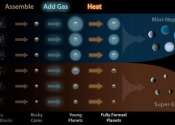How plants' threat-detection mechanisms raise the alarm
New work led by Carnegie's Zhiyong Wang untangles a complex cellular signaling process that underpins plants' ability to balance expending energy on growth and defending themselves from pathogens. These findings, published ...









